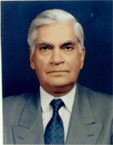Ishfaq Ahmad facts for kids
Quick facts for kids
Ishfaq Ahmad
|
|
|---|---|

Ishfaq Ahmad, c. 1990s
|
|
| Born | 3 November 1930 |
| Died | 18 January 2018 (aged 87) |
| Nationality | Indian, (1930–1947) Pakistani (1947–2018) |
| Alma mater | Université de Montréal University of Punjab |
| Known for | Nuclear Deterrence Contribution to Pion and particle physics Stellar nucleosynthesis |
| Awards | Nishan-i-Imitiaz (1998) Hilal-i-Imtiaz (1995) Sitara-i-Imtiaz (1989) |
| Scientific career | |
| Fields | Nuclear Physics |
| Institutions | Pakistan Atomic Energy Commission PINSTECH Institute International Atomic Energy Agency Government College University National Center for Physics Planning Commission |
| Thesis | Structure et identification des trajectoires dans les emulsions ionographiques à grain fin (1959) |
| Doctoral advisor | Pierre Demers |
| Other academic advisors | Rafi Chaudhry |
| Notable students | Javed Aslam Fazal Hussain Samar Mubarakmand |
Ishfaq Ahmad (born November 3, 1930 – died January 18, 2018) was a very important Pakistani scientist. He was a nuclear physicist, which means he studied the tiny parts that make up atoms. He also worked as a science advisor for the Government of Pakistan.
About Ishfaq Ahmad
Ishfaq Ahmad was born in Gurdaspur, British India (which is now part of India). He later became a citizen of Pakistan. He studied at the University of the Punjab and the Université de Montréal. He earned a special degree called a D.Sc..
He was a professor of high-energy physics at the National Center for Physics. This field of science looks at the smallest particles in the universe and how they behave.
His Work and Contributions
Ishfaq Ahmad worked at many important places. These included the Pakistan Atomic Energy Commission and the PINSTECH Institute. He also worked with the International Atomic Energy Agency, which is a global group that promotes safe and peaceful nuclear science.
He was known for his work in Pion and particle physics. Pions are a type of subatomic particle. He also contributed to the study of Stellar nucleosynthesis, which is how stars create heavier elements.
One of his most notable contributions was to Pakistan's nuclear program. This program helped Pakistan develop its own nuclear defense.
Awards and Honors
Ishfaq Ahmad received many high honors for his work. These awards showed how much his country appreciated his contributions to science. Some of his top awards included:
- Nishan-i-Imitiaz (1998)
- Hilal-i-Imtiaz (1995)
- Sitara-i-Imtiaz (1989)
He also received several Gold Medals from different scientific groups in 1998. In 2000, he was given an honorary Doctorate of Science from the UET Lahore.
Later Life
Ishfaq Ahmad passed away on January 18, 2018, in Islamabad, Pakistan. He was 87 years old. His work left a lasting impact on science in Pakistan and around the world.
 | Tommie Smith |
 | Simone Manuel |
 | Shani Davis |
 | Simone Biles |
 | Alice Coachman |

